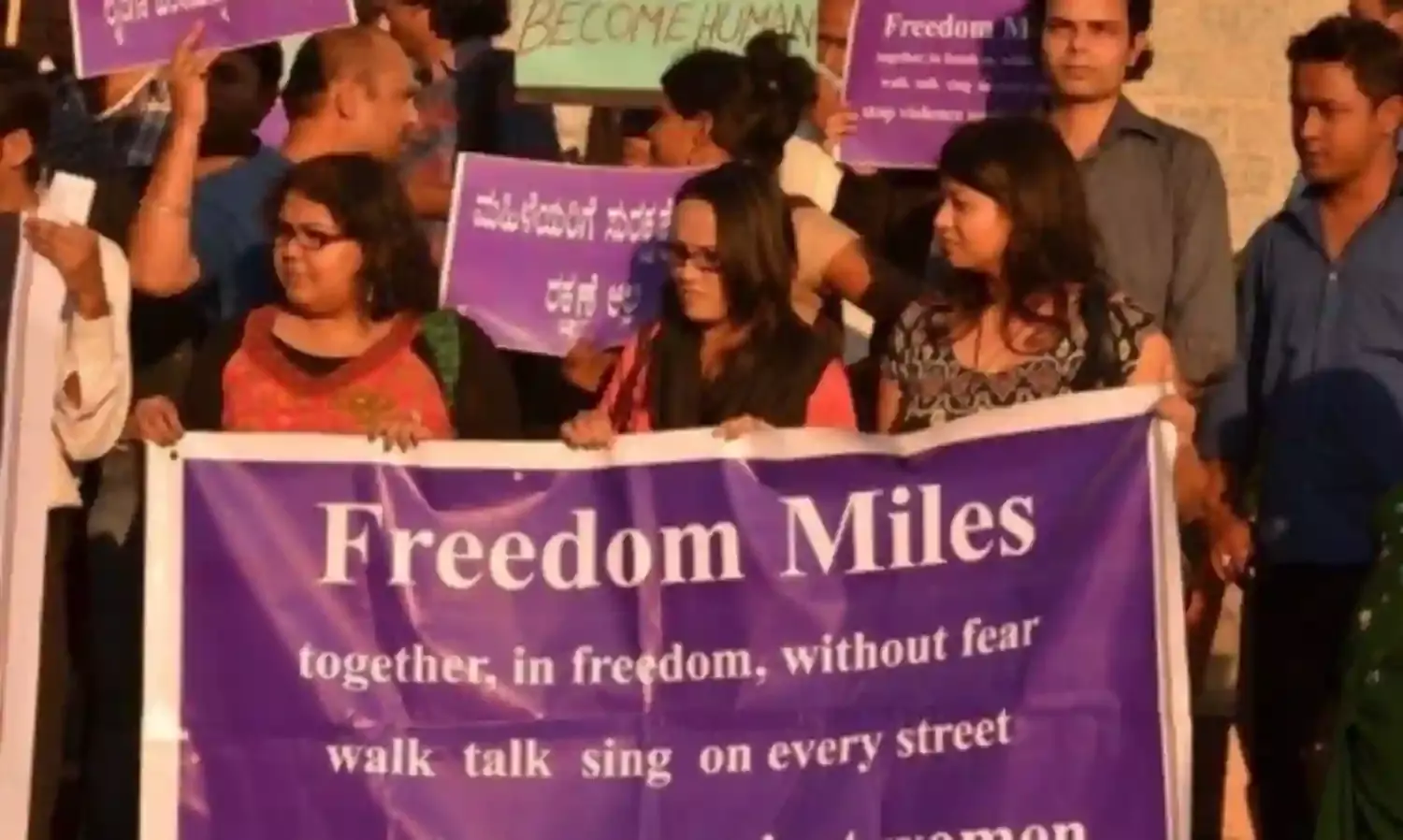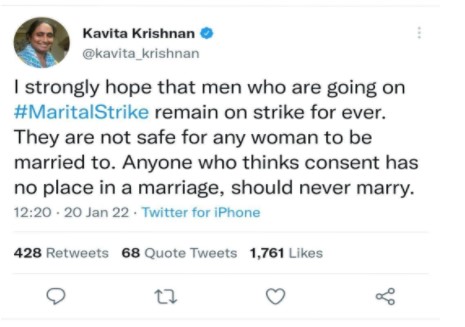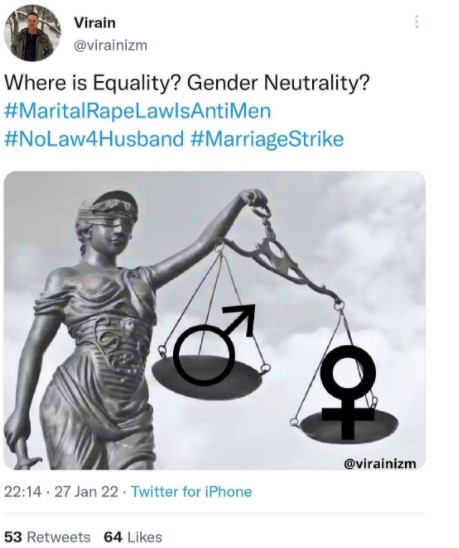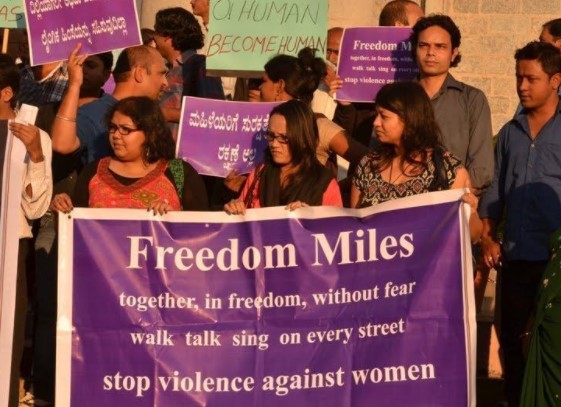'Men ki Baat': A Story of Consent in India
'They are not safe for any woman to be married to'

“Rape is Rape” says founder of Girl Up Rise, Aanya Wig.
For the past few days, an upsurge of men’s rights activists and supporters on Twitter have made #marriagestrike go viral. The campaigners fear that removing the marital rape exception in Section 375 will give women the chance to use it frivolously.
Twitter user @Virainizm who is a men’s rights activist associated with Vastaav Foundation told The Citizen, “Men believe such laws do more damage rather than any good, as they are highly misused to file fake cases against men to extort money in the form of settlements.”
It was on January 20 that a Delhi High Court bench comprising Rajiv Shakdher and C Hari Shankar heard petitions challenging the exception in Section 375 of the Indian Penal Code that prevents forcible sexual acts by the husband to his wife being considered rape. Public interest litigations seeking to strike down this “marital rape immunity” have been filed by the NGO RIT Foundation, the All India Democratic Women’s Association, and two private individuals, a man and a woman.
Section 375 defines “rape” as committed by a man. The exception reads, “Sexual intercourse by a man with his own wife, the wife not being under fifteen years of age, is not rape.” Senior advocate Rebecca John reportedly made strong arguments in the Delhi High Court that eliminating this exception would restore the bodily integrity of a woman as the exception was “an instrument of oppression”.
John who is amicus curiae in the case argued that the issue stretches back to Lord Macaulay’s statement that the marital rape exception is “in favour of the husband's conjugal rights”. However, she said, “The colonial masters have done away with it, while we continue to hang on”. Along with the United Kingdom, countries like Australia, Bhutan, Brazil, Ghana, Burkina Faso, Vietnam, United States all have laid out that rape within marriage is a criminal act.
The issue has attracted a range of arguments, from feminists and men’s rights activists.

Anil Murti, founder of men’s rights organisation Save Indian Family tells The Citizen, “There is institutional discrimination of men going on for a long time: Article 14 of the constitution is blatantly, openly violated. At least for women, something is there but for us nothing. This makes us second class citizens.”
Murti, who is the creator of the hashtag marriage strike goes on to add, “So many women are openly violent. Where is the logic comes that a woman cannot beat her husband?”
Asked about real cases of marital rape he replied, “The feminists, media, foreign bodies are doing fake surveys. We would request them to do comprehensive open surveys.”
The National Family Health Survey in 2005-06 states that 93% of 80,000 women reported sexual abuse at the hands of their current or former husbands.
The survey in 2015-16 states that 99.1% of such cases go unreported.
Set up in the aftermath of Nirbhaya, the Verma Committee concluded that consent should precede the relationship between the offender and victim.
Barkha Trehan, director of Purush Aayog, told The Citizen, “As a nation, we can only move forward when we become a gender-neutral society.”
“All should have same laws – one nation, one law” Trehan adds.
Questioning the judiciary and the government, she asks, “When will our Prime Minister start talking about ‘Men ki Baat’? Why are the lawmakers in deep slumber, why can’t they hear the pain of a man?”
Echoing the thoughts of Save Indian Family, Trehan comments, “Beti Bachao Beti Padhao should not be at the cost of Beta Marwaao, we need to save our families.”
The Union Government made arguments aligning with the men’s rights campaigners, saying that criminalising this can hamper “the institution of marriage”, The Wire reports.

Specialising in family law and women and child welfare, lawyer Udit Gupta chimes in by saying, “Women have legal provisions such under the domestic violence act, sections 498A, 406, 34. Therefore, I don't see the need for a separate bill on marital rape. However, if the court feels to pass a separate bill, it should be merged with the complaints under the previous sections.”
Gupta, who practices at the Delhi High Court added, “Delhi High Court should look into the formula of penalising marital rape. Proper examinations, cross-examinations must take place, otherwise every matrimonial dispute will end up in the woman filing a complaint of marital rape.”
Back in July 2021, a two-judge bench of the Kerala High Court gave a landmark judgement saying that marital rape is a justified ground for divorce.
The court order on 30 July also read, “Treating wife's body as something owing to husband and committing a sexual act against her will is nothing but marital rape. Right to respect for his or her physical and mental integrity encompasses bodily integrity, any disrespect or violation of bodily integrity is a violation of individual autonomy”.
“The objective of Section 375 is the protection of every woman against violation of their bodily integrity, dignity and privacy. Can marital status be a ground to differentiate between the nature and character of the right to consent? And if marital status cannot be a ground for that differentiation, the marital rape exception must fall,” says lawyer and Feminism in India contributor Vanita Bhatnagar.
Bhatnagar, who writes extensively on the intersection of gender and law says, “The whole basis of law under Section 375 is consent or the lack thereof; there has to be a credible justification for the legislature to say that the same physical act done in similar circumstances, wherein a woman saying no, does not become rape merely because of the relationship of the parties being their marriage.”
She details her understanding, “This exception was inserted before the Constitution came into force and hence we cannot assume that the provision is constitutionally valid. Since courts have recognised that consent can be withdrawn even during or in between a sexual act, the assumption of ‘consent in perpetuity’ cannot be legally valid.”
“Further, we need to see this in the light of other Supreme Court judgements like the right to abortion. Hence, the law cannot de-legitimise the sexual consent of women in favour of procreation while also recognising an exception, the right to abortion. Hence the exception creates an unreasonable classification between married and unmarried women and, by corollary, takes away the right of a married woman to give consent to sexual activity,” Bhatnagar concludes.
The Phulmani case of Bengal in 1889, where an 11-year old wife was raped by her 35-year-old husband, led to passage of the second Age of Consent Bill, raising the age from 10 to 12. The move attracted considerable backlash at that time, and claims that the British Government was trying to Westernise Hindu customs.
“Why is ‘implied consent’ in a marriage considered as ‘irrevocable consent’? Why doesn’t a woman have the choice and freedom to say no? Why is the definition of a ‘sacrosanct’ marriage equal to one without consent?” asks gender rights advocate and SUSI scholar Aanya Wig.
Wig adds, “What irks me even more, are the arguments made on the basis of the ‘duties of a wife’, which reflects the arguments of the petitioners, who question the legal validity of ‘consent in perpetuity’ because a woman can withdraw consent during sexual activity.”




